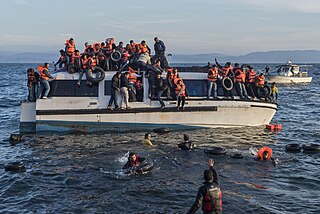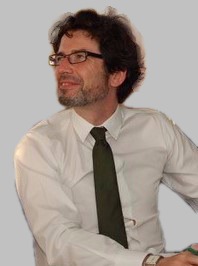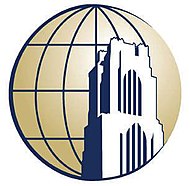
Human migration involves the movement of people from one place to another with intentions of settling, permanently or temporarily, at a new location. The movement often occurs over long distances and from one country to another, but internal migration is also possible; indeed, this is the dominant form of human migration globally. Migration is often associated with better human capital at both individual and household level, and with better access to migration networks. Age is very also important for both work and non-work migration. People may migrate as individuals, in family units or in large groups. There are four major forms of migration: invasion, conquest, colonization and emigration/immigration.

An internally displaced person (IDP) is someone who is forced to flee their home but who remains within their country's borders. They are often referred to as refugees, although they do not fall within the legal definitions of a refugee.

Forced displacement is the involuntary or coerced movement of a person or people away from their home or home region. This movement may have been caused by a variety of factors including natural disasters, violence, ethnic cleansing, individual or group persecution, droughts, civil wars, deportation and population transfer. The UNHCR defines 'forced displacement' more narrowly as: displaced "as a result of persecution, conflict, generalized violence or human rights violations".

Environmental migrants are people who are forced to leave their home region due to sudden or long-term changes to their local environment. These changes compromise their well-being or secure livelihood, and include increased drought, desertification, sea level rise, and disruption of seasonal weather patterns. Climate refugees may flee or migrate to another country, or they may migrate internally within their own country.[2] Though there is no uniform and clear-cut definition of environmental migration, the idea is gaining growing attention as policy-makers and environmental and social scientists attempt to conceptualize the potential societal effects of climate change and environmental degradation.

Marina von Neumann Whitman is an American economist, writer and former automobile executive. She is a Professor of Business Administration and Public Policy at the University of Michigan's Ross School of Business as well as The Gerald R. Ford School of Public Policy.
The Graduate School of Public and International Affairs (GSPIA) is one of 17 schools comprising the University of Pittsburgh. Founded in 1957 to study national and international public administration, GSPIA prides itself on its "Local to Global" distinction. As of 2018, it is one of only two policy schools with programs in the top 20 for both International Relations and City Management and Urban Policy. The current mayor of Pittsburgh, Bill Peduto, is a GSPIA alumnus.

The Graduate Institute of International and Development Studies, or the Graduate Institute, abbreviated IHEID, is a government-accredited postgraduate institution of higher education located in Geneva, Switzerland.

Howard Adelman is a Canadian philosopher and former university professor. He retired as Professor Emeritus of Philosophy at York University in 2003. Adelman was one of the founders of Rochdale College, as well as the founder and director of York's Centre for Refugee Studies. He was editor of Refuge for ten years, and since his retirement he has received several honorary university and governmental appointments in Canada and abroad. Adelman was the recipient of numerous awards and grants, and presented the inaugural lecture in a series named in his honor at York University in 2008.
Keith David Watenpaugh is an American academic. He is Professor of Human Rights Studies at the University of California, Davis. A leading American historian of the contemporary Middle East, human rights, and modern humanitarianism, he is an expert on the Armenian Genocide and its denial, and the role of the refugee in world history.

The Center on International Cooperation (CIC) is a foreign policy think tank based at New York University that works to enhance multilateral responses to global problems, including: conflict, humanitarian crises, and recovery; international security challenges, including weapons proliferation and the changing balance of power.; and resource scarcity and climate change. Through innovative applied research and direct engagement with policy actors, CIC has been at the forefront of policy decision-making in each of its core areas of research.
The Montreal Institute for Genocide and Human Rights Studies (MIGS) is a research institute based at Concordia University in Montreal, Quebec, Canada. It was founded in 1986 and promotes human rights awareness, in the field of genocide and mass atrocities by hosting frequent events, publishing policy briefs, engaging in counter activism on the web, and many other programs. Its keystone project is the Will to Intervene (W2I) Project which, under the advisement of Lt. General Roméo Dallaire and MIGS' Director Frank Chalk, builds domestic political will in Canada and the United States to prevent future mass atrocities.
The Fletcher School of Law and Diplomacy is the graduate school of international affairs of Tufts University, in Medford, Massachusetts. The Fletcher School is one of America's oldest graduate schools of international relations and is well-ranked in its masters and doctoral programs. As of 2017, the student body numbered around 230, of whom 36 percent were international students from 70 countries, and around a quarter were U.S. minorities. The school's alumni network numbers over 9,500 in 160 countries, and includes ambassadors, diplomats, foreign ministers, high-ranking military officers, heads of nonprofit organizations, and corporate executives.
Institute for the Study of International Migration is a private research institute located in Washington, DC. Founded in 1998 as part of Georgetown University's School of Foreign Service, it is associated with the Georgetown University Law Center. The Institute for the Study of International Migration (ISIM) is an innovative multidisciplinary center that studies the social, economic, environmental, and political dimensions of international migration.
Myron Weiner was an American political scientist and renowned scholar of India, South Asia, internal and international migration, ethnic conflict, child labor, democratization, political demography, and the politics and policies of developing countries.

The Balsillie School of International Affairs (BSIA) is a centre for advanced research and teaching on global governance and international public policy, located in Waterloo, Ontario. As one of the largest social sciences initiatives in Canada, the school is a collaborative partnership between the University of Waterloo, Wilfrid Laurier University, and the Centre for International Governance Innovation. The BSIA is housed in the north and west wings of the CIGI Campus. Admission to BSIA is highly selective.
Migration studies is the academic study of human migration. Migration studies is an interdisciplinary field which draws on anthropology, prehistory, history, economics, law, sociology and postcolonial studies.

The Institut Barcelona d'Estudis Internacionals (IBEI) is an interuniversity research institute and postgraduate education center located in Barcelona, established in 2004 as a joint initiative between the Barcelona Centre for International Affairs and five universities in the Barcelona metropolitan area, as a center of excellence in international studies. The President of the Institute is Narcís Serra, former Minister of Defense and former Vice President of Spain, and the Director is Jacint Jordana, Professor of Political Science at the Pompeu Fabra University.
The Asia Pacific Centre for the Responsibility to Protect (APR2P) is the regional centre for the Responsibility to Protect (R2P) in the Asia Pacific Region. Situated on campus at Brisbane’s University of Queensland, the centre hosts on-site researchers to ‘deepen knowledge and advance policy on the Responsibility to Protect principle and mass atrocities prevention and response in the Asia Pacific region’.

Luis Peral was a Spanish academic, analyst and facilitator who specialised in international law, human rights, international humanitarian law, forced migration, peacekeeping and peace-building, conflict analysis and private diplomacy. As an academic, Luis had extensive experience working with different institutions in Spain: Universidad Carlos III, Centro de Estudios Políticos y Constitucionales, IE School of International Relations, Institut Barcelona d’Estudis Internationals. He significantly contributed to the literature on international law, human rights, humanitarian law, forced migration, refugee and migration law and peacebuilding. As a legal and policy analyst, he worked principally on forced migration derived from generalised violence and conflict, as well as on the Responsibility to Protect with particular emphasis on the relationship between security and human rights. As a facilitator, he participated in confidence-building processes in Abkhazia, Georgia as well as between Colombia and Venezuela. He significantly contributed to the set-up of a mechanism for monitoring the Colombian peace process, and worked on international proposals for the settlement of the Western Sahara conflict. In Tunisia and Egypt, he has been involved in supporting local actors in creating transitional justice mechanisms and facilitating democratization processes. He has been particularly involved in the design of comprehensive international responses to conflict situations in Democratic Republic of the Congo, Syria, Libya, and Afghanistan, where he was a member of the Initial Assessment Team established by the International Security Assistance Force (ISAF), the NATO-led security mission in Afghanistan. He was part of academic and policy networks of global outreach, such as the Editorial Board of the Refugee Law Reader, the Global Research Group (GG10), and the Task Force on the Role of the EU in the Prevention of Mass Atrocities.











